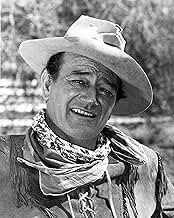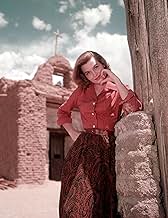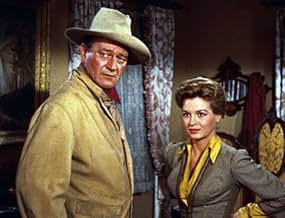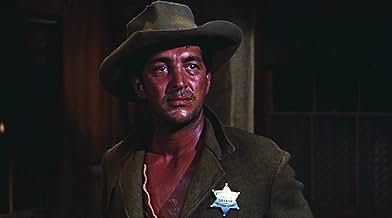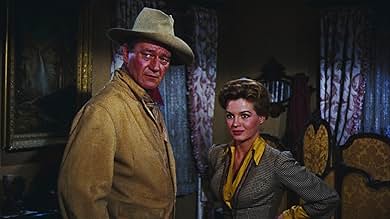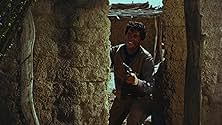A small-town sheriff in the American West enlists the help of a disabled man, a drunk, and a young gunfighter in his efforts to hold in jail the brother of the local bad guy.A small-town sheriff in the American West enlists the help of a disabled man, a drunk, and a young gunfighter in his efforts to hold in jail the brother of the local bad guy.A small-town sheriff in the American West enlists the help of a disabled man, a drunk, and a young gunfighter in his efforts to hold in jail the brother of the local bad guy.
- Director
- Writers
- Stars
- Awards
- 4 wins & 5 nominations total
Pedro Gonzalez Gonzalez
- Carlos Robante
- (as Pedro Gonzalez-Gonzalez)
Malcolm Atterbury
- Jake (Stage Driver)
- (scenes deleted)
Harry Carey Jr.
- Harold
- (scenes deleted)
Sheb Wooley
- Cowboy
- (scenes deleted)
Fred Aldrich
- Barfly
- (uncredited)
Frank Balderrama
- Barfly
- (uncredited)
Walter Barnes
- Charlie
- (uncredited)
George Bell
- Barfly
- (uncredited)
Audrey Betz
- Bartender
- (uncredited)
- Director
- Writers
- All cast & crew
- Production, box office & more at IMDbPro
Featured reviews
Howard Hawks initially wanted to reunite John Wayne and Montgomery Clift who had worked so well together in Red River in his second film with Wayne. Clift however was at the beginning of the slide that would ultimately destroy him in seven years and said no. It was then that Dean Martin was cast as John Wayne's alcoholic deputy.
By the way if Clift had done the part it would have reunited him with Walter Brennan also who is playing a very similar part to the one he did in Red River in relation to Wayne.
In the wordless beginning of Rio Bravo, Wayne while going into the town saloon to fetch Dino, witnesses a cold blooded killing perpetrated by Claude Akins. Akins is the no good brother of rich rancher John Russell who keeps trying to spring Akins from Wayne's jail. He also brings in some hired guns who bottle the town up.
Both Howard Hawks and John Wayne absolutely hated High Noon and made Rio Bravo as their answer to it. This sheriff doesn't go around begging for help from the townspeople he's sworn to protect. He's supposed to be good enough to handle the job himself with some help from only a few good men.
Dean Martin said that the Rio Bravo role for him was one of the most difficult. At that time he was playing a drunk on stage and was not yet into the substance abuse problems that beset him later on. But turns in a stellar performance.
This film marked the farewell feature film performance of Ward Bond who took some time from his Wagon Train TV series to play the small role of a Wayne friend who offers to help and gets killed for his trouble. Fitting it should be in the starring film of his best friend John Wayne.
The only bad note in Rio Bravo is that of Ricky Nelson who is too much the nice kid from Ozzie and Harriet to suggest being a young gun. But Rio Bravo marked the first of many films Wayne used a current teenage idol to insure box office. Later on Frankie Avalon, Fabian, Bobby Vinton all the way down to Ron Howard in The Shootist brought a younger audience in for the Duke.
James Caan who played the Ricky Nelson part in El Dorado was much superior to Nelson. Then again, Caan is an actor. But I will say that Dean and Ricky sung real pretty.
When you hear Dean singing My Rifle, Pony, and Me in the jailhouse, you might recognize the same melody from Red River as Settle Down. Dimitri Tiomkin wrote it and Dean recorded it as well as the title song for Capitol records. At Capitol Dino did mostly ersatz Italian ballads, it was what he was identified with. When he switched to Reprise, Dino started doing far more country and western and it really starts with the songs he did in Rio Bravo.
Rio Bravo is a leisurely paced western, probably one of the slowest John Wayne ever did. But Howard Hawks created some characters and a story that hold the interest through out.
By the way if Clift had done the part it would have reunited him with Walter Brennan also who is playing a very similar part to the one he did in Red River in relation to Wayne.
In the wordless beginning of Rio Bravo, Wayne while going into the town saloon to fetch Dino, witnesses a cold blooded killing perpetrated by Claude Akins. Akins is the no good brother of rich rancher John Russell who keeps trying to spring Akins from Wayne's jail. He also brings in some hired guns who bottle the town up.
Both Howard Hawks and John Wayne absolutely hated High Noon and made Rio Bravo as their answer to it. This sheriff doesn't go around begging for help from the townspeople he's sworn to protect. He's supposed to be good enough to handle the job himself with some help from only a few good men.
Dean Martin said that the Rio Bravo role for him was one of the most difficult. At that time he was playing a drunk on stage and was not yet into the substance abuse problems that beset him later on. But turns in a stellar performance.
This film marked the farewell feature film performance of Ward Bond who took some time from his Wagon Train TV series to play the small role of a Wayne friend who offers to help and gets killed for his trouble. Fitting it should be in the starring film of his best friend John Wayne.
The only bad note in Rio Bravo is that of Ricky Nelson who is too much the nice kid from Ozzie and Harriet to suggest being a young gun. But Rio Bravo marked the first of many films Wayne used a current teenage idol to insure box office. Later on Frankie Avalon, Fabian, Bobby Vinton all the way down to Ron Howard in The Shootist brought a younger audience in for the Duke.
James Caan who played the Ricky Nelson part in El Dorado was much superior to Nelson. Then again, Caan is an actor. But I will say that Dean and Ricky sung real pretty.
When you hear Dean singing My Rifle, Pony, and Me in the jailhouse, you might recognize the same melody from Red River as Settle Down. Dimitri Tiomkin wrote it and Dean recorded it as well as the title song for Capitol records. At Capitol Dino did mostly ersatz Italian ballads, it was what he was identified with. When he switched to Reprise, Dino started doing far more country and western and it really starts with the songs he did in Rio Bravo.
Rio Bravo is a leisurely paced western, probably one of the slowest John Wayne ever did. But Howard Hawks created some characters and a story that hold the interest through out.
When Joe Burdette (Claude Akins) murders a man on a whim, Sheriff John T. Chance (John Wayne) arrests him and puts him in small Texas town's jail. The problem is that the U.S. Marshall is a week away from taking Burdette off his hands, and Burdette's brother, Nathan (John Russell), won't see his brother put away. Complicating the situation even further, Burdette is rich enough to hire a score of thugs, and the only support that Chance has is from a drunk, Dude (Dean Martin), and an elderly crippled man, Stumpy (Walter Brennan).
Rio Bravo is a sprawling pressure cooker. For anyone not used to the pacing of older films, this is not the best place to begin. Uninitiated audiences are likely to find it boring--the plot is relatively simple, and they would likely have a difficult time remaining with Rio Bravo for its 2 hour and 21 minute running time. It's best to wait until one is acclimated to this kind of pacing, so as not to spoil the experience. The film is well worth it.
John Wayne was an enthralling paradox, and maybe no film better demonstrates why than Rio Bravo. He had almost delicate "pretty boy" looks and a graceful gait that were an odd contrast to his hulking height and status as the "action hero" of his day. He speaks little, and doesn't need to, although he is the star and thus the center of attention. He tends to have an odd smirk on his face. Wayne's performance here interestingly parallels the pacing and tenor of the film--that's not something that one sees very often, or at least it's not something that's very easy to make conspicuous.
And he's not the only charismatic cast member. Dean Martin, Ricky Nelson, Walter Brennan and Angie Dickinson are equally captivating. Even when the full blow-out action sequence begins (and that's not until about two hours into the film, although there are a few great shorter action scenes before that), the focus here is still on the interrelationships between these characters, with Brennan the continually funny comic foil, Nelson the suave, skilled youngster, Martin the complex and troubled but likable complement to Wayne, and Dickinson as the sexy, forward and clever love interest.
Director Howard Hawks seems to do everything right. He guides cinematographer Russell Harlan in capturing subtly beautiful scenery--like the mountains in the distance over the tops of some buildings, and a great sunrise shot--and asks for an atmospheric score (such as the repeated playing of Malaguena by a band in the background) that shows that plot points weren't the only element of the film that influenced John Carpenter (who partially based his Assault on Precinct 13 (1976) on this film). But most intriguing is probably Hawks' staging/blocking. You could easily make a study of just that aspect of the film. The characters are always placed in interesting places in the frame, and they're constantly moving in interesting ways throughout the small collection of buildings and streets that make up the town. There is almost a kind of performance art aspect to it. Wayne, for instance, repeatedly touches base at the jail, then picks up his rifle, circles around to the hotel and back, almost as if he's doing some kind of western Tai Chi.
Rio Bravo is nothing if not understated, and as such, it may take some adjustments from modern, especially younger, viewers. But it's a gem of a film, and worth watching and studying.
Rio Bravo is a sprawling pressure cooker. For anyone not used to the pacing of older films, this is not the best place to begin. Uninitiated audiences are likely to find it boring--the plot is relatively simple, and they would likely have a difficult time remaining with Rio Bravo for its 2 hour and 21 minute running time. It's best to wait until one is acclimated to this kind of pacing, so as not to spoil the experience. The film is well worth it.
John Wayne was an enthralling paradox, and maybe no film better demonstrates why than Rio Bravo. He had almost delicate "pretty boy" looks and a graceful gait that were an odd contrast to his hulking height and status as the "action hero" of his day. He speaks little, and doesn't need to, although he is the star and thus the center of attention. He tends to have an odd smirk on his face. Wayne's performance here interestingly parallels the pacing and tenor of the film--that's not something that one sees very often, or at least it's not something that's very easy to make conspicuous.
And he's not the only charismatic cast member. Dean Martin, Ricky Nelson, Walter Brennan and Angie Dickinson are equally captivating. Even when the full blow-out action sequence begins (and that's not until about two hours into the film, although there are a few great shorter action scenes before that), the focus here is still on the interrelationships between these characters, with Brennan the continually funny comic foil, Nelson the suave, skilled youngster, Martin the complex and troubled but likable complement to Wayne, and Dickinson as the sexy, forward and clever love interest.
Director Howard Hawks seems to do everything right. He guides cinematographer Russell Harlan in capturing subtly beautiful scenery--like the mountains in the distance over the tops of some buildings, and a great sunrise shot--and asks for an atmospheric score (such as the repeated playing of Malaguena by a band in the background) that shows that plot points weren't the only element of the film that influenced John Carpenter (who partially based his Assault on Precinct 13 (1976) on this film). But most intriguing is probably Hawks' staging/blocking. You could easily make a study of just that aspect of the film. The characters are always placed in interesting places in the frame, and they're constantly moving in interesting ways throughout the small collection of buildings and streets that make up the town. There is almost a kind of performance art aspect to it. Wayne, for instance, repeatedly touches base at the jail, then picks up his rifle, circles around to the hotel and back, almost as if he's doing some kind of western Tai Chi.
Rio Bravo is nothing if not understated, and as such, it may take some adjustments from modern, especially younger, viewers. But it's a gem of a film, and worth watching and studying.
It says much about current cinema that this vintage slice of Hollywood is now considered too long and too slow by the modern generation of movie goers. Howard Hawks labours to create setting, mood and pace introducing genuine characters are colourful for the flaws they have as their positive points presenting heroes one can empathise with, people with three dimensions, not thin caricatures that popular many of today's movies.
No character empathises this more than Dean Martin's broken down drunk Dude. Nicknamed "Borachon" by the Mexicans (Borachon is Spanish for "Drunkard") Dude battles with the demons that drove him to drink as he desperately tried not to let down Sheriff Chance, John Wayne, who believes in him more than he believes in himself. Dude's pouring back of a glass of bourbon into the bottle is one of the most life affirming scenes ever committed to film.
Wayne never really does anything other than play John Wayne and Hawks spins on this playing with the ethos of the man. The same steadfast values that mean Wayne's Sheriff John T. Chance will not release the prisoner Joe Burdette back to his murderous gang leave him stiff and awkward in front of Angie Dickinson's love interest "Feathers" creating perhaps the quintessential John Wayne movie in which the Jules Furthman and Leigh Brackett's screenplay explores the depths of the ideals that Wayne stands for. This is a movie about not just about redemption, but about the reasons for a tough redemption in a World in which collapse and lawlessness are easier options.
And when Dude pours his Bourbon back, affirming that even though he cannot be the man he was but he can still be a good man, you will not be wishing it was film in bullettime.
No character empathises this more than Dean Martin's broken down drunk Dude. Nicknamed "Borachon" by the Mexicans (Borachon is Spanish for "Drunkard") Dude battles with the demons that drove him to drink as he desperately tried not to let down Sheriff Chance, John Wayne, who believes in him more than he believes in himself. Dude's pouring back of a glass of bourbon into the bottle is one of the most life affirming scenes ever committed to film.
Wayne never really does anything other than play John Wayne and Hawks spins on this playing with the ethos of the man. The same steadfast values that mean Wayne's Sheriff John T. Chance will not release the prisoner Joe Burdette back to his murderous gang leave him stiff and awkward in front of Angie Dickinson's love interest "Feathers" creating perhaps the quintessential John Wayne movie in which the Jules Furthman and Leigh Brackett's screenplay explores the depths of the ideals that Wayne stands for. This is a movie about not just about redemption, but about the reasons for a tough redemption in a World in which collapse and lawlessness are easier options.
And when Dude pours his Bourbon back, affirming that even though he cannot be the man he was but he can still be a good man, you will not be wishing it was film in bullettime.
John Wayne- Dean Martin - Ricky Nelson -- with production by Warner Bros. , bring them together in Howard Hawks' "Rio Bravo" . John Chance (John Wayne) is the marshal of a Texas border little town who imprisons gunslinger Joe (Claude Atkins) into jail for being brought to justice . But Joe's brother is a corrupt baron land named Nathan (John Russell) . Then Chance takes on a blockade of gunfighters . He along with a cripple old (Walter Brennan ) are besieged and only helped by a drunk (Dean Martin) and a cocky youngster (Ricky Nelson) as hired hand . Meanwhile the tough Wayne falls in love with an enigmatic young (Angie Dickinson)...and the girl they all call 'Feathers' . Wheeler...a chunk of solid granite now crumbling with age...Burdette...he was the knife poised at the throat of Rio Bravo...Old Stumpy...no teeth...one leg...but all the rest was guts...and Dean and Ricky sing, too!. "My Rifle, My Pony and Me" "Rio Bravo" "Cindy" . The fought back to back...No quarter given...No quarter asked...No way in...No way out...of Rio Bravo. Feathers...the one girl who could give the big guy a hard time...
Action western, an agreeable love story , shoot-outs at regular intervals , and humor abound in this magnificent film whose characters are splendidly portrayed . It packs larger-than-life roles , uproarious events and lively happenings . The Duke carries strong acting on his brawny shoulders and perfectly does . The picture is mainly lifted out by veteran Brennan's wonderfully acting as a half-crazed likable old man , whose finger itches demoniacally on the trigger every time he gets a nasty guy in his sights . And of course , top-drawer Dean Martin with an unexpected excellent performance as alcoholic sheriff . Colorful Technicolor cinematography by cameraman Russell Harlan who adds much to the setting of this unique Western. Marvelous musical score by Dimitri Tiomkin including the Mexican ¨Degueyo¨, music also played during ¨John Wayne's Alamo¨ siege. This overlong , too much-acclaimed and very gripping Western will appeal to John Wayne fans. Rating : Above average, essential and indispensable Western , a masterpiece horse opera whose reputation has improved over the years.
Subsequently , Howard Hawks shot ¨El Dorado¨ in similar style with a hot-headed James Caan as Mississipi who is a virtual retreat of the previous young sidekick named Colorado-Ricky Nelson . Howard Hawks also displays a number of similarities to the posterior ¨Rio Lobo¨ starring Wayne, Victor French, Jorge Rivero and again with an old short-tempered person played by Jack Elam . Furthermore, a semi-remake on modern times by John Carpenter was called ¨Assault on Precinct 13¨.
Action western, an agreeable love story , shoot-outs at regular intervals , and humor abound in this magnificent film whose characters are splendidly portrayed . It packs larger-than-life roles , uproarious events and lively happenings . The Duke carries strong acting on his brawny shoulders and perfectly does . The picture is mainly lifted out by veteran Brennan's wonderfully acting as a half-crazed likable old man , whose finger itches demoniacally on the trigger every time he gets a nasty guy in his sights . And of course , top-drawer Dean Martin with an unexpected excellent performance as alcoholic sheriff . Colorful Technicolor cinematography by cameraman Russell Harlan who adds much to the setting of this unique Western. Marvelous musical score by Dimitri Tiomkin including the Mexican ¨Degueyo¨, music also played during ¨John Wayne's Alamo¨ siege. This overlong , too much-acclaimed and very gripping Western will appeal to John Wayne fans. Rating : Above average, essential and indispensable Western , a masterpiece horse opera whose reputation has improved over the years.
Subsequently , Howard Hawks shot ¨El Dorado¨ in similar style with a hot-headed James Caan as Mississipi who is a virtual retreat of the previous young sidekick named Colorado-Ricky Nelson . Howard Hawks also displays a number of similarities to the posterior ¨Rio Lobo¨ starring Wayne, Victor French, Jorge Rivero and again with an old short-tempered person played by Jack Elam . Furthermore, a semi-remake on modern times by John Carpenter was called ¨Assault on Precinct 13¨.
This is one of the great Westerns of all-time. Hawks at his best, as are John Wayne and Walter Brennan. Dean Martin has the chops and we get a little music, too. The script is slightly better than 'El Dorado' and it comes together in a perfect blend of action, drama and entertainment. It's just a classic.
Did you know
- TriviaThe sets in Old Tucson are built to 7/8th scale, so the performers look larger than life.
- GoofsAt night when Dude and Chance are making their rounds, the camera follows Dude as he walks briefly off the set. A huge concrete pillar that he walks past can be seen.
- Quotes
Feathers: I thought you were never going to say it.
John T. Chance: Say what?
Feathers: That you love me.
John T. Chance: I said I'd arrest you.
Feathers: It means the same thing, you know that.
- ConnectionsEdited into La Classe américaine : Le Grand Détournement (1993)
Details
Box office
- Gross worldwide
- $27,763
- Runtime2 hours 21 minutes
Contribute to this page
Suggest an edit or add missing content




